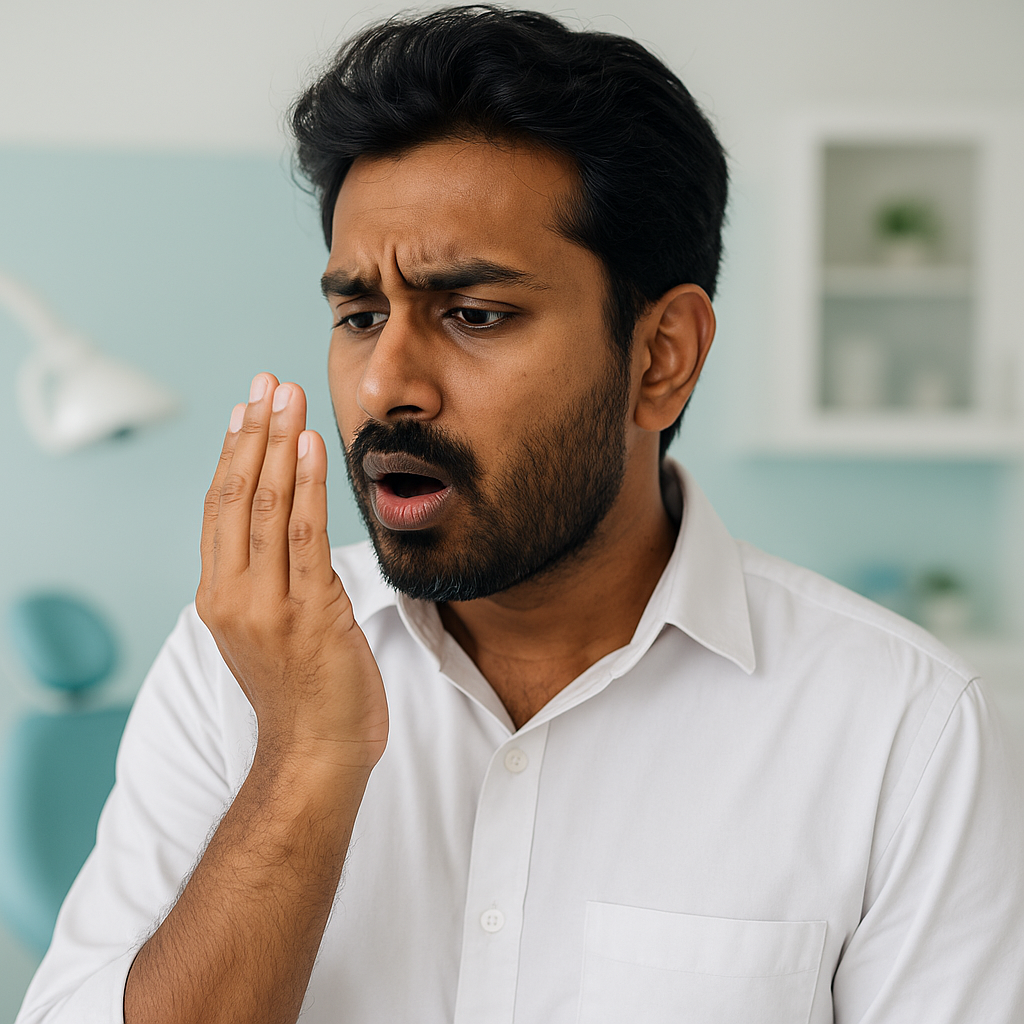
Imagine stepping into an elevator for a client meeting or leaning in to read your child a bedtime story, only to worry, “Does my breath smell fresh?” You’re not alone—bad breath (or halitosis) is a universal concern, and it can affect our confidence, relationships, and even signal deeper health problems. Whether you’re a busy professional, a frequent flyer, or a health-conscious parent, understanding and tackling bad breath is crucial for both your personal and professional life.
What Is Bad Breath—And Why Should You Care?
Bad breath, clinically known as halitosis, is more than just a social inconvenience—it can be a sign of underlying dental or health issues. While most people have experienced “morning breath” or post-coffee odor, persistent halitosis is different. Chronic bad breath can impact your self-esteem, hinder interactions, and sometimes alerts you to hidden dental diseases or systemic conditions.
Bad breath matters because it’s not just about minty freshness—it’s an important clue from your body about your health.
Common Causes of Bad Breath
There’s no single culprit behind bad breath—let’s break down the most common causes and how they might arise in everyday life:
- Poor Oral Hygiene:
Skipping brushing or flossing allows bacteria to feast on leftover food in your mouth, resulting in foul odors. Picture dishes piling up in the sink—that’s what happens in your mouth over time! - Foods and Drinks:
Garlic, onions, and coffee are notorious for lingering longer than intended. A quick espresso before a meeting? The aroma might stay with you, long after the caffeine buzz fades. - Dry Mouth:
Saliva acts as your mouth’s natural cleansing agent. Dehydration (often a result of travel or back-to-back meetings), certain medications, or simply breathing through your mouth can leave you with “cottonmouth” and accompanying odors. - Gum Disease:
Gum infections harbor bacteria that emit persistent, unpleasant smells. Bleeding gums while brushing is a red flag—don’t ignore it. - Smoking and Tobacco:
Smoking isn’t just a cause of bad breath—it dries your mouth, damages gum tissue, and leaves its own stubborn odor. - Medical Conditions:
Sometimes, halitosis originates beyond the mouth. Sinus infections, diabetes, reflux, and even tonsil stones can all play a role. If you’re tackling your oral routine but still notice bad breath, it’s worth considering other health factors.
Signs You Might Have Bad Breath (And How to Check)
One of the trickiest parts about bad breath is that we often can’t sense our own odor. To check discreetly:
- The Wrist Test: Lick your wrist, let it dry for a few seconds, then sniff. If there’s a foul scent, it may reflect your breath.
- The Floss Test: Floss between your back teeth and smell the floss—if it’s unpleasant, those hard-to-reach spots may be harboring bacteria.
- Ask Someone You Trust: Awkward, perhaps, but honest feedback from a close friend or partner can be invaluable.
If you consistently detect odor (or get feedback from others), it’s time to pay closer attention to your oral health.
How to Prevent Bad Breath: Practical Strategies
Good news—most cases of bad breath can be managed or prevented with steady habits. Here’s what you can do:
1. Master Your Oral Hygiene Routine
- Brush Twice Daily: Use a fluoride toothpaste and don’t neglect brushing your tongue, where many odor-causing bacteria gather.
- Floss Every Day: Flossing removes hidden food particles and plaque between teeth that brushing can’t reach.
- Replace Your Toothbrush: Every 3-4 months, or after illness.
2. Watch Your Diet
- Limit Strong-Smelling Foods Before Social Events: If you have an important meeting or meet-up, be mindful of garlic, onions, or highly spiced dishes.
- Skip the Sugary Snacks: Sugar fuels bacteria.
- Snack on Crunchy, Water-Rich Foods: Apples and carrots can help clean your teeth naturally.
3. Stay Hydrated
- Carry Water: Especially during flights or long workdays. Saliva is your first defense against odor, and water helps keep it flowing.
- Chew Sugar-Free Gum: Stimulates saliva and offers a quick freshness boost on the go.
4. Avoid Smoking and Tobacco
- Need Help Quitting? Talk to your dentist or healthcare provider about resources—they’re invested in helping you succeed.
5. Rinse and Freshen
- Mouthwash: Use alcohol-free antibacterial mouthwash as needed.
- Natural Rinses: A simple saltwater rinse is a gentle, effective way to support oral health between brushing.
When Should You See a Dentist?
Most instances of bad breath improve with diligent hygiene and lifestyle tweaks. However, professional help is warranted if:
- Your bad breath persists for more than a week despite good habits
- Your gums are swollen, bleed easily, or you notice loose teeth
- There’s a persistent bad taste or pain in your mouth
- You suspect underlying health issues (e.g., diabetes, sinus infection)
Early dental visits help not only with fresh breath but are also key in catching gum disease and even screening for oral cancers—something Dental Explore champions as part of your complete health.
Treatment Options: When Simple Fixes Aren’t Enough
If your dentist identifies a deeper cause, treatment might include:
- Professional Cleanings: Removes hardened plaque (tartar) and addresses gum inflammation.
- Targeted Therapy: If you have gum disease, intensive cleaning or other dental procedures may be recommended.
- Prescription Products: Specialized mouthwashes or toothpaste can reduce specific bacteria or dry mouth.
In rare cases, your dentist may suggest further medical evaluation to rule out systemic causes.
Quick Home Remedies and Fixes
Traveling or in a pinch? These strategies offer quick relief:
- Drink plain water regularly, especially after meals or coffee.
- Chew sugar-free gum or mints.
- Rinse with a mild saltwater solution if no other products are available.
- Crunch on raw fruits or veggies to dislodge debris.
While these remedies don’t substitute for a solid daily routine, they’re effective interim solutions.
Conclusion: Fresh Breath, Every Day
Bad breath doesn’t have to stand between you and your best moments—at work, at home, or on the road. By understanding what causes halitosis and taking proactive steps, you reclaim both confidence and control over your health. And remember: persistent mouth odor can sometimes be an early warning sign, so don’t hesitate to seek expert advice.
At Dental Explore, we’re committed to making oral health simple, accessible, and actionable—wherever you are in the world.
Take Action Now
Have a question or story about your journey to fresher breath? Share it in the comments below—we’d love to connect!
For more expert tips and the latest in dental wellness, subscribe to Dental Explore, or book a consultation with a dental professional today. Your healthiest, most confident smile starts here.
